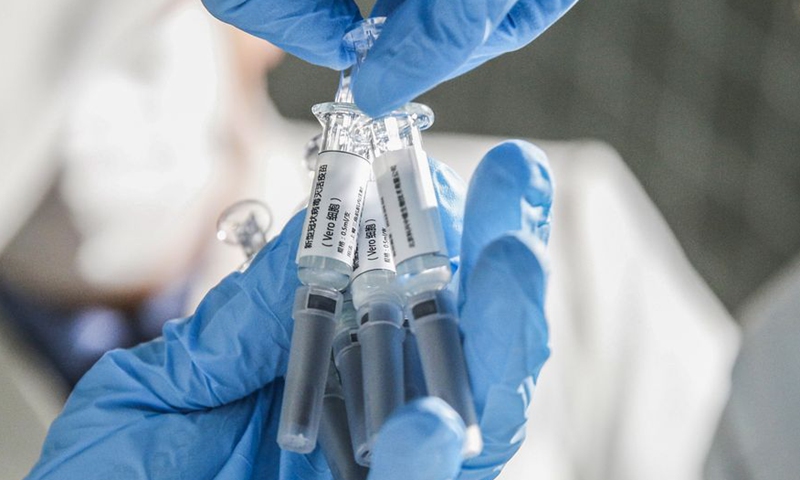Safety and Immunogenicity of a China-developed COVID-19 vaccine candidate proved in phase 2 clinical trials
By Zhang Ni and Leng Shumei Source: Global Times Published: 2020/7/21 1:05:15

Photo:Xinhua
A COVID-19 vaccine candidate developed by Chinese researchers proved safe and able to induce immunogenity with low does, according to a report released on The Lancet on Monday.
Experts said the results indicate China's landmark progress regarding latest vaccine technology and once again proves China's leadership in COVID-19 vaccine research and development.
The vaccine is a recombinant novel coronavirus vaccine jointly developed by Chinese top vaccine researcher Chen Wei and Chinese biopharmaceutical company CanSinoBIO.
The phase 2 trial was randomized, double-blind and placebo-controlled trial conducted in a single center in Wuhan, Central China's Hubei Province. There were 508 volunteers over the age of 18 who participated in the trial, according to The Lancet report.
The vaccine induced seroconversion of the neutralizing antibodies in 59 percent and 47 percent of the participants, and seroconversion of binding antibody in 96 percent and 97 percent of participants, in the 1×10¹¹ and 5×10¹⁰ viral particles dose groups, respectively.
A single injection of the vaccine at 1×10¹¹ viral particles and 5×10¹⁰ viral particles induced comparable specific immune responses to the spike glycoprotein at day 28, with no significant differences noted between the two groups, according to the report.
Tao Lina, a Shanghai-based vaccine expert, told the Global Times on Tuesday that inducing an immune response with one single injection in a low dose is an advantage of the vaccine as other candidates currently under development, including a mRNA candidate developed in the US and another recombinant candidate developed by Oxford University, all reportedly needed two injections to induce an immune response and the two injections should be conducted with intervals of three to four weeks.
"That means our vaccine's production capacity can be double of the other two, largely improving our viral prevention efficiency," Tao noted.
According to the report, 95 percent of participants in the 1×10¹¹ viral particles dose group and 91 percent of the recipients in the 5×10¹⁰ viral particles dose group showed either cellular or humoral immune responses at day 28 post vaccination. Positive specific T-cell responses were found in 90 percent and 88 percent of participants receiving the vaccine's viral particles at 1×10¹¹ and 5×10¹⁰ respectively, according to the report.
CanSinoBIO's vaccine candidate also behaves better than the US and UK-developed candidates in inducing cellular immunity, which is difficult to induce, Tao noted. He said that the activation of two kinds of immunity can help prolong the period of the vaccine's efficacy.
Overall, about 355 volunteers among the total of 508 experienced at least one or more adverse effect like fever and headache during the trial. No serious adverse effects were documented within 28 days, the authors said.
The percentage is a little bit high, but within an acceptable scope for a COVID-19 vaccine, according to Tao.
This study is the first randomized controlled trial for evaluation of the immunogenicity and safety of a candidate non-replicating Ad5-vectored COVID-19 vaccine, the authors said.
The authors said that they are planning an international multicentre, randomised, doubleblind, controlled phase 3 effectiveness trial to further evaluate the efficacy of the vaccine.
Tao estimated that 5,000-10,000 volunteers would be enough for the phase three clinical trials if it is conducted in places with high incidences. Primary results can be collected in about one month after the trial is launched.
Two inactivated COVID-19 vaccine candidates developed in China have entered phase three clinical trials.
"If everything moves along smoothly, a vaccine can be available in China in October, being approved on the market or in usage on some specific groups," Tao said.
He tried to ease public concerns by saying that the vaccine would not be approved for emergency use until its safety and efficacy exceeds 90 percent.
RELATED ARTICLES:
Posted in: SOCIETY